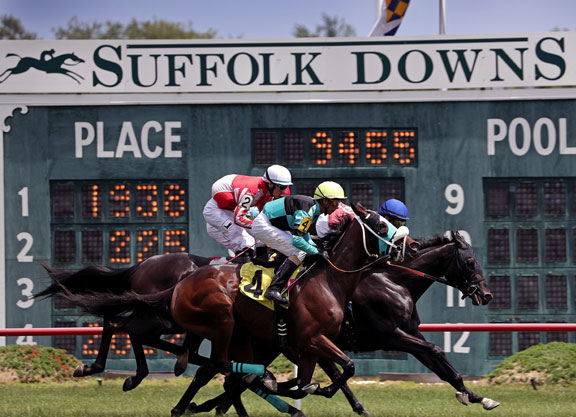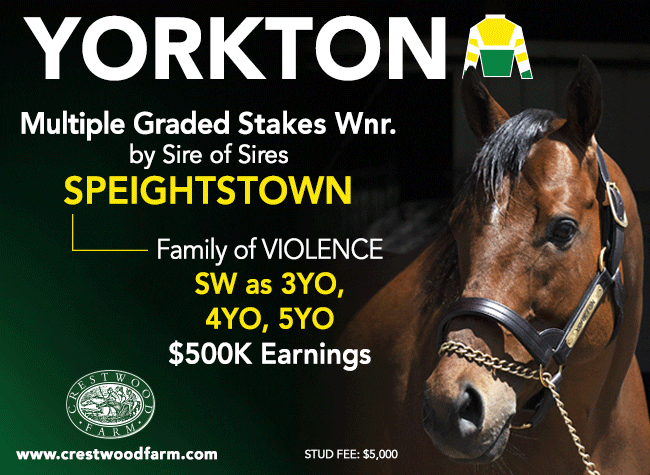By Bill Finley
The first race-ever run at Suffolk Downs was a $1,000 maiden won by a horse named Eddie Wrack, his victory a popular one as he was sent off at 3-1 by an on-track crowd estimated at 35,000 people at the newly opened Boston track the Associated Press called “immense and lavish.” They came that day, July 10, 1935, to welcome and celebrate a new track and one that was sure to be a centerpiece of what was emerging as a booming area when it came to Thoroughbred racing.
The feature that day was the $5,000 Commonwealth Cup, won by Boxthorn, who had run 16th earlier in the year in the Kentucky Derby. He was ridden by Don Meade, the same Don Meade who won the infamous 1933 Derby aboard Brokers Tip after the “fighting finish” with jockey Herb Fisher that included the two slashing each other with their whips as their mounts neared the wire.
The mood will be quite different Sunday at Suffolk Downs, where a much smaller crowd will come to say a final goodbye to a track that lasted for 84 years but in the very end couldn't find a formula that worked to keep live racing alive. Soon after the horses cross the wire for the 12th race, the $50,000 John Kirby Stakes for Massachusetts-breds, the wrecking ball and the bulldozers will move in and start the process of turning the racetrack property into housing and a shopping district.
Suffolk's fate was sealed in 2014 when it was announced that Suffolk's application to open a casino was rejected. Instead the license was granted to a group headed by Steve Wynn, which would build a shiny new casino just a few miles down the road in Everett. To keep its simulcast license, Suffolk started to run abbreviated meets of six days or so starting in 2015. But even that is no longer possible as the property has been sold to a developer, HYM Investments, which is ready to go on its new project.
“When I first got my license in 1985 it would have been crazy to think there would no longer be any racing in New England some day,” said trainer Mike Gorham, once an annual leader in the Suffolk standings, who now trains at Delaware Park and Laurel. Gorham has four horses entered on the final card.
“There was so much racing between Suffolk, Rockingham and the Massachusetts fairs,” Gorham continued. “We even had a time where Suffolk ran during the day and Rockingham ran at night and they had no problem filling all the races. If you had told me back then that we'd get to point where there would be no more racing I would [have] told you you were crazy. This is going to be a sad day.”
Those who have been around New England racing even longer than Gorham can remember a time when there was more than just Suffolk Downs and Rockingham in New Hampshire. Maine had Scarborough Downs. In Rhode Island, there was Lincoln Downs and Naragansett. Vermont's track was called Green Mountain. In addition to Suffolk Downs, Massachusetts had a thriving fair circuit that included at times as many as six tracks. After Suffolk closes, there will no longer be any racing, not just in Massachusetts but in the entire New England region.
All that will remain is a harness track, Plainridge Park, which did not get a casino, either, but was allowed a license to have slot machines on the premises.
“There has been a 25- to 30-year shift in the landscape,” said Suffolk's COO Chip Tuttle. “Live racing was popular and profitable and now, while it still has some level of popularity, it is far less profitable. You can see it in other jurisdictions as well as here. The wagering dollars that were concentrated on live racing are now diffused in multiple ways. We were a Double A horse racing franchise aspiring to be a Triple A franchise in a very major league town. There are lot of people who live in this area who will pay attention to the Saratoga meet but they didn't have a ton of interest in 5,000 claimers racing in November. That sounds harsh, but part of it was the elongated racing schedule with lower-level purses. The market for that level of racing was just not here.”
As New England bettors gravitated more and more to the simulcast signals from the major league tracks and then took their dollars to ADWs, where with a couple of clicks of their mouse, they could choose a $75,000 allowance race at Belmont over a $3,500 maiden claimer at Suffolk, handle continued to decline and that led to an even worse product.
The original description of Suffolk Downs as “immense and lavish” didn't last long. To be kind, it became an unpretentious, blue-collar track over the years. Call it hardscrabble. To be more truthful, it turned into a dump, its patrons more often referring to it as “Sufferin' Downs” rather than by its actual name. Still, it had the sort of character and toughness that is a part of the fabric of all of Boston. When on-track betting was the only option available, the Boston horseplayers would still find their way out to Suffolk no matter that it might have been a raw day in February with temperatures in the teens and the feature was a $10,000 claimer. That they might curse out a jockey who had just lost on a 2-5 shot and grumble that they had just witnessed another boat race at a place where it was known that not every race was always on the up-and-up, was, somehow, all a part of the charm.
Under the ownership of Buddy LeRoux, a former owner of the Red Sox who is among the most unpopular people in the long annals of Boston sports history, Suffolk closed for the 1990 and 1991 seasons because LeRoux was unhappy with the level of financial help the state was willing to give him. After a two-year hiatus, Suffolk was rescued by owner and breeder James B. Moseley, who not only reopened the track but spent the type of money needed to see to it that it was no longer such an eyesore.
Suffolk made a nice comeback, highlighted by two straight victories by Cigar in the Massachusetts Handicaps in 1995 and 1996. But eventually, despite the efforts of a dedicated management team led at the time by Lou Raffeto and Moseley's commitment to the track, the economic realities of small track without a large handle sitting on a valuable piece of property caught up with Suffolk Downs.
So, on Sunday, they will gather for one last day of racing and to say goodbye.
“Even though everybody has had a long time to get ready for this inevitability, it still has a tinge of sadness to it,” Tuttle said. “We're trying to make this weekend as much of a celebration of the 84-year legacy as anything else and we are looking to send racing off in style.”
Suffolk's owners are seriously interested in revitalizing Massachusetts racing at the old Great Barrington Fair, which is in the far coroner of Western Massachusetts. Great Barrington, which once proudly hailed itself as the “Belmont of the Berkshires,” has not raced since 1989, but there are plenty of reasons for trying to reopen the place. It would allow Suffolk's owners to stay involved in the off-track betting business and possibly open the doors some day for a sports betting license. There's also the money out there to make the project viable.
When Suffolk was shut out of the casino business, some of the money derived at the state's casinos was put into a horse racing development fund in hopes of keeping the sport alive in the Bay State. Tuttle estimated that there is about $13 million in the fund, but that won't do New England horsemen any good if they have no place to race.
The Stronach Group has also mentioned its intention to some day build a racetrack in Massachusetts, but has had little to say of late as to whether or not those plans are still on the table.
Thanks in part to the Race Horse Development Fund money, Suffolk will go out with an excellent card. A total of $397,000 in purse money will be given away, and the smallest purse on the card is a $6,500 claimer with a $20,000 pot. With that type of money available, prominent trainers such as Christophe Clement, Michael Matz, George Weaver and Joe Sharp will be among those filling the last two cards of the 2019 season that consisted of six days of racing.
“If we could win at least one race over the weekend that would be great and, hopefully, we can win a couple more,” Gorham said. “The last time we won one up there there were probably 30 people in the winner's circle and it was for a $5,000 claimer. I hadn't had 30 people in the winner's circle in a long, long time. I think everyone we knew that was there and [had] been a part of New England racing wanted to get into that winner's circle so they could feel like they were a part of history.”
Not a subscriber? Click here to sign up for the daily PDF or alerts.






